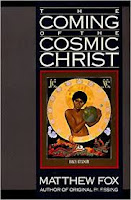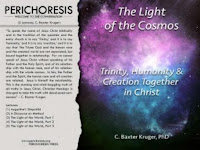Truths We Believe About God, Part 6
A Biblical & Theological Rejection of Wm. Paul Young’s
book, Lies We Believe About God
Part 1: Truths We Believe About God
Part 2: Doing the Universalist Twist
Part 3: OUR Way or THE Way?
Part 4: An Imaginary Cosmic Reality
Part 5: Universalism & Trinitization
salvation… just as also our beloved brother Paul… wrote to you, as
also in all his letters… which the untaught and unstable distort, as
they do also the rest of the Scriptures, to their own destruction.”
—The Apostle Peter (2 Peter 3:14-16, NASB)
A Review of the Book’s Chapters (continued)
A Catena
A catena… is a chain of Scriptures (various translations based on the Greek New Testament) strung together as a commentary on the theme of God’s saving work for all—the grand arc of God’s drama of redemption. When read aloud with a touch of gravitas [‘dignity, seriousness, or solemnity of manner,’ ed.], the momentum is powerful:
—Wm. Paul Young, Lies We Believe About God, 241, color emphasis added.
Commentary on Young’s A Catena: Part 1
Young weaves together a series of Scripture passages, something he calls A Catena. He extracts and intertwines thirty-four Scripture passages in his catena, many extracted from the Apostle Paul’s letters. In this weaving-deceiving he attempts to make biblically believable the conversation he’s having with naïve readers. His Catena only includes passages containing the words “all,” “every,” “world,” “cosmos,” “everything” or “everyone,” passages he personally selects to fit his template and provide cover for his aberrant theology.
My commentary on the Bible passages Young quotes to support “the theme of God’s saving work for all” will appear, Lord willing, in three installments. My commentary will not be presented according to the order he has arranged the passages, but rather will be thematically presented around the highlighted words in his selected passages: “all… world… everything… everyone… whole… every… cosmos…” and two miscellaneous passages. Part 1 will focus on the “all” passages.
Why such detailed attention to interpreting these catena-passages you might ask? For two reasons: First, as indicated by the popularity of The Shack, Christian universalism may attract many “converts” from among mainstream evangelicals thereby becoming the future belief of the movement in America and perhaps elsewhere. And second, none of us have the right to “cherry pick” texts to support the unsupportable; that is to proof-text evangelical universalism which designation is in and of itself oxymoronic. We begin with the keyword, “all.”
The “All” Passages (1-12)
1. Luke 3:6 (NASB, emphasis Young’s):
“And then all flesh [or mankind] shall see the salvation of God.”
To introduce the ministry of John the Baptist Luke quotes Isaiah 40:5 (“then the glory of he Lord will be revealed, and all flesh will see it together,” NASB). Luke saw “the coming of Messiah as the fulfillment of hope for the Gentiles. The grace of God would not be confined to one nation [Israel, ed.] but like a great flood, would overflow its banks to bring salvation to all flesh.”[57] Obviously if all humanity was already secure inside the Trinity, then Luke’s quotation would have been unnecessary for from the vantage point of being inside God they would have already seen the “salvation” and the “glory of the Lord.” But from the earthly perspective seeing is not believing… the Jews saw Jesus’ miracles which demonstrated His glory and authenticated Him to be their Messiah but would not believe. According to Young’s scheme, the Gentiles were already saved inside the Trinity whether they saw Messiah’s glory or not.
2. John 1:7 (Plain English/Greek NT, emphasis Young’s):
“This man came for a witness, to bear witness of the Light, that through Him [the Light] all would believe.”
Like Luke, the Apostle John refers to the testimony of John the Baptist in this statement. As he does at other times, Young plays word games with the Word. He quotes that through the Light all would believe when other versions translate the verb as “might believe” (KJV, NKJV, NASB, NIV, NLT, NRSV, ASV, ESV, etc.) So what will it be, would believe or might believe? In the clause “that all might believe” (hina pantes pisteusosin), “The focus is on the intention of the action of the main verb, whether accomplished or not.”[58] When people heard John’s witness about the Light there was no universal guarantee that they would believe and be saved (outcome unquestionable) but only that they might believe and be saved (outcome questionable).
3. John 3:35 (AKJV, emphasis Young’s):
“The Father loves the Son, and has given all things into [the Son’s] hand.”
Ignored by Young, this verse’s context contradicts the doctrine of universal justification-reconciliation. In the next verse John the Baptist states: “He that believeth on the Son hath everlasting life: and he that believeth not the Son shall not see life; but the wrath of God abideth on him” (John 3:36, KJV). The contrast between “he that believeth” (who has eternal life) and “he that believeth not” (upon whom God’s wrath abides) contradicts universal reconciliation. John’s testimony in no way teaches the salvation of all persons, for people are not things anyway. What the statement does teach is that the Father placed all things in the Son’s hand—He’s Got the Whole World in His Hand(s)—which speaks of Jesus’ authority and rule.[59]
4. John 12:32 (Berean Literal Bible NT, emphasis Young’s):
“And , if I am lifted up from the earth, will draw [drag] all men to Myself.”
Young explains Jesus words by qualifying the verb “draw” with a possible meaning of “drag.” So what will it be? Does Jesus draw or drag all men to Himself? Does Jesus influence human hearts to respond to the message of the Cross (“if I am lifted up”), or like fish caught in a net does Jesus drag them to the Cross? (John 21:8) The understanding resides in the Greek verb helkuo, signifying “drawing by inward power, by Divine impulse.”[60] Thus, unanimously Bible versions translate helkuo as “draw.” The Septuagint (the Greek translation of the Old Testament) employs the verb to describe Yahweh’s action toward Israel; “with lovingkindness have I drawn (helkuo) thee” (Jeremiah 31:3). Another verb (Greek suro) means to drag violently (See Acts 16:19). I prefer, as do the majority of Bible versions, the normal meaning of the verb to be “draw” not “drag.”
Jesus does not drag people to Himself against their will. No. Our tender Savior, filled with loving kindness, draws us and others to Himself. He influences us to believe. What a tender image of salvation.
5. John 13:3 (NIV/ESV, emphasis Young’s):
“Jesus knew that the Father had given all things into His hands.”
The Beloved Disciple describes a tense situation. Betrayal is in the air. Likely John and the other disciples felt something was wrong but did not know exactly what. Ominously, the devil had placed it into Judas’ heart to betray Jesus. The situation seemed out of control. But everything was not out of control because Jesus knew that the Father had placed “all things” (Greek neuter panta) into His hands. In other words, Jesus controlled the situation knowing “that He had come forth from God and was going back to God” (John 13:3). Whether coming or going Jesus controlled His destiny! The verse states Jesus’ sovereignty over his situation and has nothing whatsoever to with all humanity being saved by Him. In the immediate context, “all things” includes the timing, location, betrayal, arrest, trials, crucifixion and other details surrounding Jesus’ death. His control of everything became apparent with His resurrection!
God did not sacrifice His “child” on the Cross. (LWBAG, 149, 169) Jesus was a mature man and controlled His own destiny. While Jesus submitted to the cross, He was sovereign over it. The sovereign Son gave up His life! Why? Because the Father “has given all things” into the hand of His Son which includes His power to resurrect and His authority to judge the dead (John 5:27-29). “Here Comes the Judge!” And by the way, neither are people things.
6. John 6:37, 39 (ESV, emphasis Young’s):
“All that the Father gives Me will come to Me, and the one who comes to Me I will by no means cast out…. This is the will of the Father who sent Me, that all [I add the emphasis Young omitted, ed.] He has given Me I should loose nothing, but should raise it up at the last day.”
The question regarding this passage is, has the Father given every human being who has ever lived to the Son to be their sanctuary (“I will by no means cast out”), their security (“I should loose nothing”) and their destiny (“raise it up in the last day”)? Does the Father select everybody and then give everybody to the Son for eternal safekeeping? If one pays attention to the context, the answer is “No!”
The inconsistency of Young employing Jesus’ words to fit his template of universal reconciliation is that just previously (verse 36) Jesus told the Capernaum crowd, “you have seen Me, and yet do not believe,” and subsequently, “everyone who… believes in Him will have eternal life” (verse 40). So the verse Young cites as proof of universal salvation is sandwiched between two statements by Jesus qualifying that only those who behold and believe in Him are safe in Him. Those who behold and do not believe are not safe.
Bruce notes that in John 6:37, “the pronoun ‘all’ is neuter singular (Gk. pan) denoting the sum-total of believers. In the second part (‘the one who comes’) each individual member of that sum-total is in view.”[61] The point: all were not saved because all did not come to Jesus and believe. But of those who come to Jesus by virtue of having been given by the Father to the Son, all of them are promised safekeeping in Christ forever.
7. John 17:2 (NIV, emphasis Young’s):
“For you granted him authority over all people that he might give eternal life to all those you have given him.”
In his prayer Jesus Christ first prays to the Father for Himself (John 17:1-5); second He prays to the Father for His disciples (John 17:6-19); and and finally, He prays to the Father for the church (John 17:20-26). In His prayer for the disciples Jesus states, “I guarded them and not one of them perished but the son of perdition” (John 17:12). Obviously, Jesus Christ does not give eternal life to all humans without exception, Judas being one of them. He experienced perdition, not Paradise (See Matthew 26:44.).
Further, about the world, those who neither come to Jesus Christ nor believe on Him, Jesus said that as the world hated Him it would also hate His disciples (John 17:14; John 15:18-19). If the world includes people (John 3:16), then there are people who chronically hate Jesus as well as those who believe on Him. Remember Foxe’s Book of Martyrs?[62] In light of this, it becomes impossible to lump all humans together into one loving relationship with God. Jesus said that was not going to happen. Hatred of Jesus (He said He would be hated.) leads to hating His Apostles and disciples (Matthew 10:40; 1 John 2:23; 4:6) and His Father (John 13:20).
At the consummation of all things, those who hated and rejected Jesus and His Apostle-disciples will be shocked to discover to their dismay that the Father gave Jesus the power to resurrect all of them and the authority to judge all of them, some unto “a resurrection of life” and others unto “a resurrection of judgment” (John 5:24-30).
8. Acts 3:21 (NIV/Greek NT, emphasis Young’s):
“Heaven must receive him until the time comes for God to restore all things.”
Occasioned by Peter and John’s healing of the lame man outside the temple (Acts 3:1-10), where and when they were going pray that afternoon, Peter, like he did previously on the Day of Pentecost (Acts 2:14-36), preached to a crowd of Jews who had observed the healing. It should be noted that Peter’s sermon was to the Jews, and concerned the past, present and future of Israel, God’s covenant nation. “Men of Israel…” is how Peter began his sermon (Acts 3:12, 25). That Peter mentioned Israel’s fathers (Acts 3:13, 25) and quoted from the nation’s prophets (Acts 3:18, 21, 24) further indicates he was addressing the spiritual condition of the Jewish people. What Peter told those Jews involved the nation’s past disobedience, their present opportunity and the nation’s promised future. By ignoring their prophets Israel rejected Jesus (Acts 3:13b-15). By repenting and returning to the Lord, their sins could be “wiped away” (Acts 3:19a) so that “times of refreshing might come from the presence of the Lord” (Emphasis added, Acts 3:19b). Then the nation could expectantly wait for Messiah Jesus’ return to introduce the “period of the restoration of all things about which God spoke by the mouth of His holy prophets from ancient time” (Emphasis added, Acts 3:21).
In short, “the restoration (Greek apokatastasis) of all things” refers to the fulfillment of all God’s promises to His covenant people at the culmination of this age when her Messiah would introduce His Kingdom through Israel to the world. The “times of refreshing” (i.e., apokatastasis) would also reverse the curse upon the earth and restore the planet to Eden’s pristine condition (Genesis 1:31; 3:7, 16-19; Romans 8:18-21). This verse (Acts 3:21) cited by Young in his A Catena has nothing to do with the ultimate reconciliation of all humanity to God, but has everything to do with Israel’s repenting and returning to God so that spiritual refreshing might flood the nation and flow out into the world.
In short, Peter’s statement “restore all things” does not create a package deal by which all humanity becomes saved. As William MacDonald commented:
The times of restoration of all things point forward to the Millennium. They do not indicate universal salvation, as some have suggested; such a teaching is foreign to the Bible. Rather they point to the time when creation will be delivered from the bondage of corruption and Christ will reign in righteousness as King over all the earth.[63]
 |
| For example, Bethel Redding (Source) |
Insight: By way of application, similar times of refreshing can come to the church from “the presence of the Lord” when the body of Christ, all of us, repents of its worldliness and sins, perhaps committed in ignorance (Acts 3:17), and reconciles (returns to) with Jesus. Then and only then will the smothering air of “churchianity” be blown away by a refreshing breeze from the Holy Spirit as He bears witness to the Person and Work of Jesus Christ (John 3:8; 15:26).
Among pan-evangelicals these days there’s a lot of talk about bringing down God’s presence through worship experiences stimulated by rock n’ roll music accompanied by flashing lights, with congregants swaying and moving in unity with the beat as they become one in worship as together they mouth repetitive lyrics and raise their arms and hands upward to bring heaven down, and all this capped off by a short “feel-good” sermon by the resident communicator pastor; or in an opposite direction, by retreating into solitude and silence and in that state trying to contemplate down feelings of divine presence or receive personal communication from God. But amidst all of this, there’s little if any conversation going on about Christians repenting of and confessing their sins, like Peter told the Jews to do, so that they might experience a renewed sense of the Lord’s presence.
9. Ephesians 1:9-10 (AKJV, emphasis Young’s):
God “purposed in Himself, that in the dispensation of the fullness of the times He might gather together in one all things in Christ… in heaven and… earth—in Him.”
Final culmination in Christ: the Apostle Paul looks forward to the planned transition from history into eternity. When that happens (Swoosh!”), all things from the farthest corners of the universe to the deepest recesses of earth, will be consolidated together in Christ—in Him! The universe does not run the universe (pantheism, as above so below, yin yang). Rather Christ the Creator does and His sovereignty will be revealed when all things are gathered together in Him. About the Apostle Paul’s astounding statement allow some observations to be made.
That everything will be consummated in Christ indicates that everything’s not presently in Him. The universe is not “Christed.” The dispensation of the fullness of the times has not arrived. The cup is not yet full. The assumption and lie of eastern mysticism and New Age Spirituality is that everything’s cyclically moving-evolving (i.e., being and becoming) in oneness of process.
Resembling Young and Kruger’s view of the universe (LWBAG, 127-128), Matthew Fox states that,
The Cosmic Christ is the ‘I am’ in every creature. The divine mystery and miracle of existence is laid bare in the unique existence of each atom, each galaxy, each tree, bird, fish, dog, flower, star, rock, and human.[64]
But the Christian faith anticipates a future movement when everything will become one in Christ. The universe will not collapse into nothingness but will be divinely consummated in the Lord Jesus. If in the fullness of times everything will be gathered together in Christ, this means that the universe is not currently inside the Trinity. The Apostle Paul explains the cosmos awaits future incorporation into Christ. Though that moment has not yet arrived, in the future everything in heaven and earth will be gathered together in the Christ. “For from [the Lord] and through Him and to Him are all things. To Him be the glory forever. Amen” (Romans 11:36; Compare Colossians 1:16-17; Revelation 1:8; 22:13.).
Presently, Christ dwells in regenerate Christian believers (Colossians 1:27; 2 Corinthians 5:17, “if anyone is in Christ he is a new creature,” the “if” suggesting that not everybody resides in Christ). In this letter to the Ephesians the Apostle described unbelievers as “sons of disobedience,” “indulging the desires of the flesh,” “children of wrath,” “dead in transgressions,” “separate from Christ,” “excluded from the commonwealth of Israel,” “strangers to the covenants,” “having no hope,” “without God in the world,” “darkened in their understanding,” “excluded from the life of God,” “callous,” “given over to sensuality,” “corrupted in accordance with the lusts of deceit,” and “darkness” (Ephesians 2:2, 3, 5, 12; 4:18, 19; 5:6). Are we to think that Paul is describing the state and sins of people inside the Trinity and reconciled to God? I don’t think so!
Question: With the proposal that everything’s inside the Trinity, where has God’s holiness (His separation from sin) gone? Further, as the Apostle Paul warned, “Let no man deceive you with vain words: for because of these things cometh the wrath [not love] of God upon the children (huious) of disobedience” (Ephesians 5:6). So it becomes impossible to see how those who are “children of disobedience” (disobedience runs in their spiritual DNA) can simultaneously be considered children of God. Contrary to Paul Young’s assertion, the truth is that “everyone is not a child of God.” (LWBAG, 203-208). Some are not children of God but the children of disobedience and wrath.
Unbelievers do not reside inside the Tri-Personal God. While in the fullness of times “all things” will find consummation in Christ, “all things” does include all humanity because people are not things. Paul’s description of the coming in-gathering to Christ is not personal but abstract, not regarding people but “things.” As one of my seminary teachers Dr. Harold Hoehner wrote, “This does not suggest that everyone will be saved; instead, sin’s disorder will be removed and universal peace will be established (Isa. 2:2-4; 11:1-10).”[65]
But how often have we read these passages not realizing the incredible future that awaits the cosmos in Christ? Meanwhile we can personally appreciate that, “In Him we have redemption through His blood, the forgiveness of our trespasses” (Ephesians 1:7)
10. Ephesians 1:22-23 (ESV, emphasis Young’s):
“And He put all things under His feet, and gave Him to be head over all things to the church, which is His body, the fullness of Him who fills all in all.”
These words of the Apostle reside in his prayer for the Ephesians (“I… do not cease giving thanks for you… in my prayers,” Ephesians 1:16). Generally Paul prays that “the eyes of their heart may be enlightened” (which enlightening would involve receiving from “the Father of glory… a spirit of wisdom and of revelation in the knowledge” of the Lord Jesus Christ, Ephesians 1:17). Specifically, the “enlightening” would come from the Father and involve aspects of: 1. knowing “the hope of His calling”; 2. knowing “the glory of His inheritance in the saints”; and 3. knowing “the surpassing greatness of His power toward us who believe” (Ephesians 1:18-19). All of this “knowing” (i.e., true gnosis) is made possible for reason of Christ’s resurrection from the dead, ascension to His throne in heaven, and exaltation in heaven now and in the universe during the age to come (Ephesians 1:20-21).
Explaining Christ’s exaltation, the Apostle states that from “outside and above the universe” so to speak, God the Creator put everything under the feet of the Lord Jesus Christ thereby making Him “head over all things to the church.” Dr. Leon Morris states that, “it is Christ who completes the church, not the church who completes Christ.”[66] In other words, the Lord Jesus Christ fills the church, His body, and conversely the church does not fill Christ (Ephesians 1:23). What’s the point? The verses Young cites from the Apostle’s prayer have nothing to do with reconciling all humanity within the Trinity, but rather with the Head of the universe filling His church with His fullness.
11. Colossians 1:15-17, 20 (Holman CSB, emphasis Young’s):
“He is the image of the invisible God, the firstborn over all [Young did not italicize this all, ed.] creation. For everything was created by Him, in heaven and on earth, the visible and the invisible, whether thrones or dominions or rulers or authorities—all things have been created through Him and for Him. He is before all things, and by Him all things hold together…. and through Him to reconcile all things to Himself by making peace through the blood of His cross—whether things on earth or things in heaven.”
In the flow of these Colossians verses, the repetition of the noun “things” becomes evident.[67] The Apostle wrote these verses to exalt the Lord Jesus Christ above everything in His created universe. The visage of Jesus Christ is that He’s the “the image of the invisible God,” and His title is that He’s “the firstborn of all creation” (Colossians 1:15). By His incarnation Jesus Christ made the invisible God visible (i.e., image or eikon, John 14:8-9). And for reason of His having created “everything” He is to be the honored head of the universe (i.e., “the firstborn” over all creation). Christ is the uncreated Creator of “all things… in the heavens and on earth, visible and invisible… thrones or dominions or rulers or authorities” (Colossians 1:16; See John 1:3; Hebrews 1:2-3.). This presentation of Jesus Christ ought to give us pause and cause to worship the One who created and controls the cosmos.
to receive glory and honour and power:
for Thou hast created all things,
and for Thy pleasure they are and were created.
—Revelation 4:11
Now to the issue: Does this Scripture passage exalting Jesus Christ teach the salvation-reconciliation of all humanity? For several reasons, the answer is “No!” First, just previous to his majestic description of Christ the creator and sustainer of “all things,” the Apostle tells the Colossians (personal pronouns “us,” “us,” “us” and “we”) that in contrast to surrounding pagan culture (i.e., “the domain of darkness” he called it), they had come out of that darkness to inherit “the kingdom” of the Father’s “beloved Son” (Colossians 1:13). This kingdom is not now nor will it be the kingdom of all people. “Truly, truly, I say to you,” Jesus said to Nicodemus “unless one is born again (from above) he cannot see the kingdom of God” (John 3:3, 5). Unless they are born of the Holy Spirit, people will never, no never submit to God’s rule. But to the Colossians Paul states that in the Son “we [not all, ed.] have redemption, the forgiveness of sins” (Colossians 1:14). Personal pronouns are important because “they” make personal and particular the ones who possess “redemption, the forgiveness of sins,” something which believing all humanity is saved does not accommodate. Had the Apostle intended to communicate the teaching of universal reconciliation, he could have written that the Father has rescued and transferred all into Jesus’ kingdom of Light. Obviously the Apostle knew of and used the neuter adjective “all’’ (ta panta) in this very passage. But in reference to those redeemed and reconciled to God, the Apostle used the pronouns “us,” “we” and “you” and not the inclusive adjective “all” or designation “all men” (panta anthropous). The objects of the Lord’s redemption and reconciliation are people not things.
Second, the Apostle designates the universe to be “all things” (ta panta). Paul states that God through Christ has reconciled “all things to Himself” (Colossians 1:20). As one commentator expresses, “I am led to understand God’s reconciliation of all things as encompassing the nonhuman and inanimate worlds, so that ‘even the stones will cry out’ in praise of God (Lk 19:20; see also Rev 21:19-21).”[68] Again, people are not things. Humans have been made in the “likeness” and “image” of God, which image allows them to have from God a lesser, delegated and immediate dominion (i.e. “rule”) over the earth even while the Creator Christ ultimately rules over everything (Genesis 1:26-28). Though man is the king of the earth, Christ is the King of the cosmos. While at the micro and macro levels humans may explore the universe, they do not control it. This brings us to consider the object of the Father’s reconciliation as stated by the Apostle Paul (Colossians 1:20). Does “all things” equate to “all” humans?
Third, the objects of reconciliation were those (“you” not all) who were “formerly alienated and hostile in mind, engaged in evil deeds” (Colossians 1:21). The Apostle contrasts “all things” with people, most notably in this context the Colossian Christians. Paul states that Jesus Christ, in whom “all the fullness” dwells, “reconciled you [not all, ed.] in His fleshly body through death, in order to present you [again, not all, ed.] before Him [the Father] holy and blameless and beyond reproach” (Colossians 1:22). From a straightforward reading of the text the reconciliation Paul speaks of, while making provision for the future reconciliation of this rogue universe to God (“the creation itself also will be set free from its slavery to corruption,” emphasis added, Romans 8:21; Compare 2 Peter 3:11-13.), applies only to those (you and we) who in the flow of history have “now” been reconciled through Christ to God. Call this understanding too narrow or exclusive if you wish, but this is what Paul the Apostle taught. In the equation of reconciliation, “all things” does not equal all people. F.F. Bruce commented, “to deduce from such words as these [as Wm. Paul Young and others try to do, ed.] that every last man or woman, irrespective of moral record or attitude to God, will at last enjoy eternal bliss would be (to say no more) putting on them [the words, ed.] a burden of meaning heavier than they [the words, ed.] can bear.”[69]
12. Romans 5:18 (KJV/Greek NT, emphasis Young’s):
“As through one man’s offense judgment came to all men, resulting in condemnation, even so through one Man’s righteous act the free gift came to all men, resulting in justification of life.”
Universal-reconciliation (all) demands universal-justification (all), and that’s what Young sees in this verse despite the qualification stated by the Apostle in the verse preceding; that “much more those who receive the abundance of grace and of the gift of righteousness [i.e., justification] will reign in life through the One, Jesus Christ” (Emphasis added, Romans 5:17, NASB). There is no automatic equivalence between “all” being condemned in Adam and “all” being justified in Christ. The Apostle writes that, “the free gift is not like the transgression” (Emphasis added, Romans 5:15). There are those who receive Christ’s righteousness and those who bathe themselves in self-righteousness (See Luke 18:9-14; Jesus said the desperate Publican “went to his house justified” while the self-righteous Pharisee just went home.).
While the equivalence may seem apparent, the context informs readers it’s not actual. Only those “who receive… the gift of righteousness will reign in life through the One, Jesus Christ” (Romans 5:17). Know that the English words “righteousness” and “justification” derive from the same Greek verb; the verb “justified” is dikaioo, the noun “justification” is dikaiosune and the noun “righteousness” is also dikaiosune. In short, “righteousness” equals “justification.”
As regards condemnation in Adam and justification in Christ, Dr. John A. Witmer commented: “The provision in the one righteous act, therefore, is potential and it comes to the entire human race as the offer and opportunity which are applied only to “those who receive” (v. 17).” [70] Those who receive justification will reign in life through Jesus Christ. Those who reject Christ’s righteousness will not reign with Him in life.
To be continued . . .
Endnotes:
[57] F.E. Stallan, Things Written Afore Time (Kilmarnock, GB; John Ritchie Ltd., 1990): 86.
[58] Daniel B. Wallace, Greek Grammar Beyond the Basics: An Exegetical Syntax of the New Testament (Grand Rapids, MI: Zondervan Publishing House, 1996): 472.
[59] “He’s Got the Whole World in His Hands,” Wikipedia (https://en.wikipedia.org/wiki/He%27s_Got_the_Whole_World_in_His_Hands). First published in 1927, many have performed this traditional American spiritual song.
[60] W.E. Vine, Merrill F. Unger and William White, An Expository Dictionary of Biblical Words (Nashville, TN: Thomas Nelson Publishers, 1984): 328.
[61] F.F. Bruce, The Gospel of John (Grand Rapids, MI: William B. Eerdman Publishing Company, 1983): 154.
[62] John Foxe, Foxe’s Book of Martyrs, Prepared by W. Grinton Berry (Fincastle, VA: Scripture Truth, no date). This book has been issued and reissued in numerous editions. Fox was an English martyrologist who lived 16th century (1516-1587).
[63] William MacDonald, Believer’s Bible Commentary, Arthur L. Farstad, Editor, Kindle Edition (Nashville, TN: Thomas Nelson, 1995): 1579.
[64] See Matthew Fox, The Coming of the Cosmic Christ (New York, NY: HarperCollins Publishers, 1988): 155.
[65] Harold W. Hoehner, “Ephesians,” The Bible Knowledge Commentary: An Exposition of the Scriptures, Volume II, John F. Walvoord and Roy B. Zuck, Editors (Wheaton IL: Victor Books, 1983): 618.
[66] Leon Morris, Expository Reflections on the Letter to the Ephesians (Grand Rapids, MI: Baker Books, 1994): 38.
[67] The Son is to be honored (as the “firstborn,” ed.) in the universe because, “by Him were all things [ta panta, neuter plural] created, that are in heaven, and that are in earth, visible and invisible, whether they be thrones, or dominions, or principalities, or powers: all things [ta panta, neuter plural] were created by Him, and for Him: And He is before all things [panton, neuter plural], and by Him all things [ta panta, neuter plural] consist. And He is the head of the… the church… that in all things [en pasin, neuter plural] He might [by virtue of His resurrection, ed.] have the preeminence…. And, having made peace through the blood of His cross, by Him to reconcile all things [ta panta, neuter plural] unto Himself; by Him, I say, whether they be things [ta, neuter plural] in earth, or things [ta, neuter plural] in heaven.” (Colossians 1:16-17, 20).
[68] Robert W. Wall, Colossians & Philemon: The IVP New Testament Commentary Series (Downers Grove, IL: InterVarsity Press, 1993): 77.
[69] F.F. Bruce, The Epistles to the Colossians, to Philemon, and to the Ephesians (Grand Rapids, MI: William B. Eerdmans Publishing Company, 1984): 75.
[70] John A. Witmer, “Romans,” The Bible Knowledge Commentary: An Exposition of the Scriptures, Volume II, John F. Walvoord and Roy B. Zuck, Editors (Wheaton IL: Victor Books, 1983): 460.













